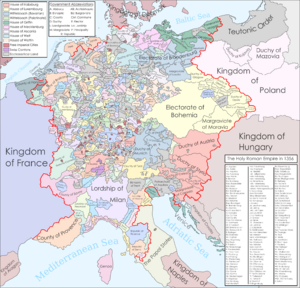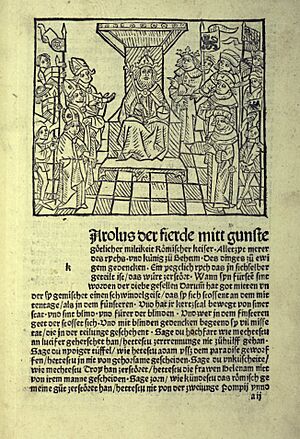Golden Bull of 1356 facts for kids
Quick facts for kids Golden Bull of 1356 |
|
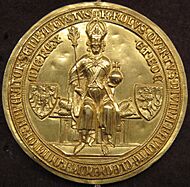 The golden seal that earned the decree its name
|
|
| Created |
|
| Location |
|
| Authors | Delegates of the Imperial Diet held in Nuremberg and Metz |
| Signers | Charles IV |
| Purpose | Franchise of the seven Prince-electors voting for the King of the Romans |
The Golden Bull of 1356 was a very important law in the Holy Roman Empire. It was like a rulebook that set out how the emperor would be chosen for over 400 years! This special law was created by Emperor Charles IV. It got its name, "Golden Bull," because it had a large, golden seal attached to it.
In 2013, the Golden Bull was added to UNESCO's Memory of the World Register. This means it is considered a very important historical document for everyone.
Contents
Why was the Golden Bull created?
Before the Golden Bull, choosing a new emperor was often messy. Powerful princes in the Holy Roman Empire would vote, but there were no clear rules. This often led to arguments and even small wars. For example, in 1314, two different emperors were chosen at the same time!
Emperor Charles IV wanted to stop these problems. He wanted to make sure the election process was clear and peaceful. The Golden Bull was created to bring "unity among the Electors" and make sure the election was "unanimous." This meant everyone would agree on the new emperor.
Who were the Prince-Electors?
The Golden Bull clearly named the seven most powerful princes who had the right to vote for the new emperor. These princes were called the Prince-electors (or Kurfürsten). They also had special ceremonial jobs at the emperor's court.
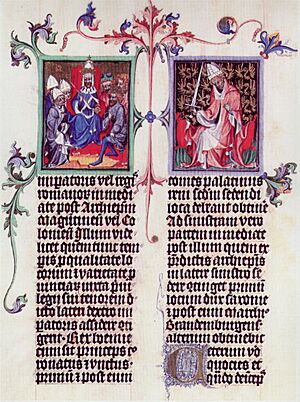
| Type | Prince-elector | Court office | Voting order |
|---|---|---|---|
| Church leaders | Archbishop of Mainz | Archchancellor of Germany | 7th |
| Archbishop of Cologne | Archchancellor of Italy | 2nd | |
| Archbishop of Trier | Archchancellor of Burgundy | 1st | |
| Secular princes | King of Bohemia | Arch-Cupbearer | 3rd |
| Count Palatine of the Rhine | Arch-Steward | 4th | |
| Duke of Saxony-Wittenberg | Arch-Marshal | 5th | |
| Margrave of Brandenburg | Arch-Chamberlain | 6th |
New rules for voting
The Golden Bull brought in some important new rules:
- Majority Vote: For the first time, it was clearly stated that a simple majority (at least four out of seven votes) was enough to elect a new king. This meant that a few electors couldn't stop the election.
- Indivisible Lands: The lands of the Prince-electors could not be divided up among their children. This rule, called primogeniture, meant that the oldest son would inherit everything. This kept the electoral vote from being split or lost.
- Special Privileges: The Golden Bull gave the electors many special rights. This made them very powerful within the Holy Roman Empire. It also helped create more independent states within the empire.
Who was left out?
Not everyone was happy with the list of Prince-electors. Two powerful families, the House of Wittelsbach and the House of Habsburg, felt left out.
- The Wittelsbach family ruled both Bavaria and the Palatinate. The Golden Bull gave the vote to the Palatinate, not Bavaria. This made the Bavarian branch of the family very upset.
- The Habsburg family, who were often rivals of Charles IV's family, were completely left out. This made them less powerful. In response, one Habsburg duke created a fake document called the Privilegium Maius. This document claimed to give Austria special rights, including passing everything to the eldest child. While ignored at first, it was later accepted when a Habsburg became emperor.
How did the election work?
The Golden Bull laid out the election process in great detail. It explained exactly where, when, and how everything should be done.
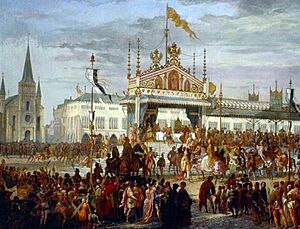
Election locations
- The election had to happen in Frankfurt. This was a tradition from old Frankish times.
- The new emperor would be crowned in Aachen.
- The first big meeting (called a diet) of the new emperor's reign would be held in Nuremberg.
Voting rules
The electors had to finish the election within 30 days. If they didn't, the Golden Bull had a strict rule:
If they don't choose a ruler within thirty days, counting from the day they took their oath, then after those thirty days, they must live only on bread and water. They cannot leave the city of Frankfurt until they, or most of them, have elected a ruler.
This rule was meant to make sure the electors worked quickly to choose a new leader!
Other rules
The Golden Bull also included many smaller rules. For example, it set the order for marching when the emperor was present. A big decision was made in chapter 15. Charles IV banned "city alliances" (called Städtebünde). These were groups of cities that had joined together for power. The Golden Bull weakened these city groups and made the nobility (princes and nobles) more powerful instead.
The Pope's role
One important thing about the Golden Bull was that it didn't mention the Pope at all. Before, Popes often tried to have a say in who became emperor. But Charles IV didn't include any need for the Pope's approval. Surprisingly, Pope Innocent VI didn't protest this. He needed Charles IV's help with other matters, so he kept good relations with the emperor.
 | Kyle Baker |
 | Joseph Yoakum |
 | Laura Wheeler Waring |
 | Henry Ossawa Tanner |


